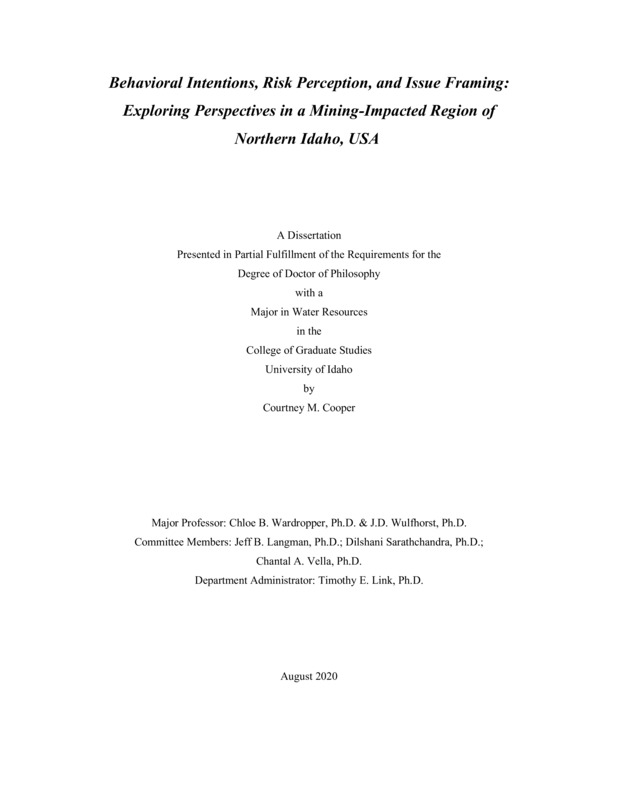Behavioral Intentions, Risk Perception, and Issue Framing: Exploring Perspectives in a Mining-Impacted Region of Northern Idaho, USA
Cooper, Courtney. (2020-08). Behavioral Intentions, Risk Perception, and Issue Framing: Exploring Perspectives in a Mining-Impacted Region of Northern Idaho, USA. Theses and Dissertations Collection, University of Idaho Library Digital Collections. https://www.lib.uidaho.edu/digital/etd/items/cooper_idaho_0089e_11918.html
- Title:
- Behavioral Intentions, Risk Perception, and Issue Framing: Exploring Perspectives in a Mining-Impacted Region of Northern Idaho, USA
- Author:
- Cooper, Courtney
- ORCID:
- 0000-0002-4270-2778
- Date:
- 2020-08
- Keywords:
- Health belief model Lead contamination Q methodology Risk perception Superfund sites
- Program:
- Water Resources
- Subject Category:
- Environmental science; Social research; Behavioral psychology
- Abstract:
-
Initiatives to remove and contain hazardous waste are complex, requiring collaboration across stakeholder groups. In the United States, the Environmental Protection Agency leads efforts to remediate and restore sites with hazardous waste through the Superfund program. Despite reductions in risk, complete removal of hazardous waste is often infeasible. Decisions about how to manage remaining hazards are influenced by how stakeholders frame economic development, public health, and environmental issues. In cases where contaminants such as lead [Pb] are present, risk communicators must also encourage people to practice health protective behaviors to reduce exposure risks. Risk perceptions influence how people receive and act on this risk communication information. The overall goal of my dissertation was to understand issue framing, behavioral intentions, and risk perceptions at a Superfund site with widespread lead contamination in a mining-impacted region of northern Idaho, USA. I conducted my research in partnership with the Panhandle Health District, an agency responsible for enforcing regulations and policies related to the Superfund program and public health. The dissertation includes four primary chapters. The first assesses associations between residents’ perceived health risk and their behavioral intentions to avoid Pb contamination. The second explores how economic, public health, and environmental priorities influences primary issue frames related to stakeholder perspectives about site remediation and restoration. The third offers perspectives about best practices for integrating participatory research when studying issues related to water and society. The final chapter presents a case study analysis of challenges and opportunities for risk communication. Implications from my research inform future risk communication strategies and collaborative planning processes in mining-impacted regions.
- Description:
- doctoral, Ph.D., Water Resources -- University of Idaho - College of Graduate Studies, 2020-08
- Major Professor:
- Wardropper, Chloe B; Wulfhorst, J.D.
- Committee:
- Sarathchandra, Dilshani; Langman, Jeff B; Vella, Chantal A
- Defense Date:
- 2020-08
- Identifier:
- Cooper_idaho_0089E_11918
- Type:
- Text
- Format Original:
- Format:
- application/pdf
- Rights:
- In Copyright - Educational Use Permitted. For more information, please contact University of Idaho Library Special Collections and Archives Department at libspec@uidaho.edu.
- Standardized Rights:
- http://rightsstatements.org/vocab/InC-EDU/1.0/

